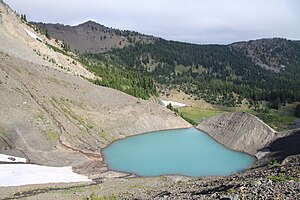Moraine: Difference between revisions
Jump to navigation
Jump to search

George Swan (talk | contribs) (more details) |
George Swan (talk | contribs) (add image) |
||
| Line 1: | Line 1: | ||
{{subpages}} | {{subpages}} | ||
[[File:Map of Long Island topography.jpg | left | thumb | [[Long Island]], a large island off the coast of [[New York (U.S. state)|New York]] and [[Connecticut (U.S. state)|Connecticut]], is a terminal moraine.]] | |||
[[File:Three Fingered Jack in summer 2011 (6).JPG | thumb | the hills around this lake are all part of a terminal moraine.]] | |||
A '''moraine''' is an accumulation of a mixture of material moved by a [[glacier]].<ref name=PrinciplesOfSedimentology>{{cite book |last1=Boggs |first1=Sam |title=Principles of sedimentology and stratigraphy |date=2006 |publisher=Pearson Prentice Hall |location=Upper Saddle River, N.J. |isbn=0131547283 |edition=4th |page=281}}</ref> | A '''moraine''' is an accumulation of a mixture of material moved by a [[glacier]].<ref name=PrinciplesOfSedimentology>{{cite book |last1=Boggs |first1=Sam |title=Principles of sedimentology and stratigraphy |date=2006 |publisher=Pearson Prentice Hall |location=Upper Saddle River, N.J. |isbn=0131547283 |edition=4th |page=281}}</ref> | ||
| Line 7: | Line 9: | ||
Other moraines form when a glacier starts to melt, released silt, clay, sand, gravel and rocks that had been frozen within.<ref name=PrinciplesOfSedimentology/> Melting water carries the released material to a lower point on the glaciers surface. And, once the glacier has fully melted away, there is a pile of glacially carried material. | Other moraines form when a glacier starts to melt, released silt, clay, sand, gravel and rocks that had been frozen within.<ref name=PrinciplesOfSedimentology/> Melting water carries the released material to a lower point on the glaciers surface. And, once the glacier has fully melted away, there is a pile of glacially carried material. | ||
==References== | ==References== | ||
{{reflist|refs= | {{reflist|refs= | ||
}} | }} | ||
Latest revision as of 07:08, 15 February 2024
A moraine is an accumulation of a mixture of material moved by a glacier.[1]
Moraines consist of silt, clay, sand, gravel and rocks, all gathered from different locations the glacier crossed.[1] Different parts of a moraine may consist of different proportions of the basic ingredients.
Terminal moraines form at the greatest extent of a glacier, ploughed up like a snow-plow.[1]
Other moraines form when a glacier starts to melt, released silt, clay, sand, gravel and rocks that had been frozen within.[1] Melting water carries the released material to a lower point on the glaciers surface. And, once the glacier has fully melted away, there is a pile of glacially carried material.
References
- ↑ 1.0 1.1 1.2 1.3 (2006) Principles of sedimentology and stratigraphy, 4th. Upper Saddle River, N.J.: Pearson Prentice Hall. ISBN 0131547283.

